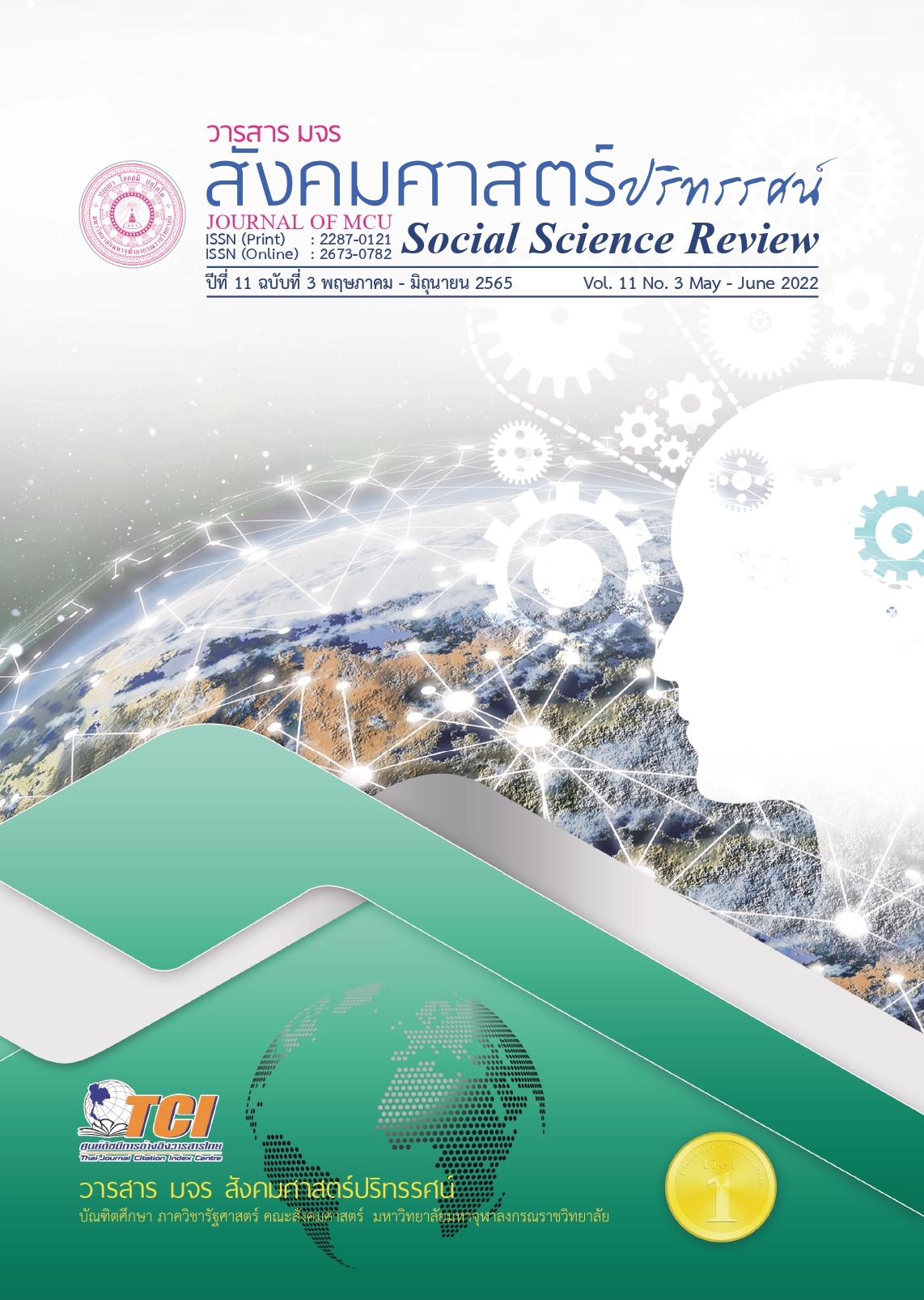ผลกระทบจากสถานการณ์โควิดที่มีต่อการจัดการศึกษาไทย
คำสำคัญ:
การเรียนการสอนทางไกล, สถานการณ์โควิด, ยุควิถีชีวิตปกติใหม่, การศึกษาออนไลน์บทคัดย่อ
ผลกระทบทางบวกต่อการจัดการเรียนรู้ในสถานการณ์โควิด–19 พบว่า สถานศึกษามีการปรับเปลี่ยนแผนและเป้าหมายในการจัดการศึกษา มีการปรับปรุงระบบเครือข่ายอินเทอร์เน็ตให้มีคุณภาพสูงขึ้น มีการใช้รูปแบบการจัดการเรียนรู้และเทคโนโลยีใหม่ ๆ ทำให้การจัดการเรียนรู้น่าสนใจยิ่งขึ้น และมีการใช้วิธีการวัดประเมินผลใหม่ ๆ มากขึ้น ผู้บริหารพัฒนาตนเองให้มีความรู้และทักษะการบริหาร ครูเรียนรู้และพัฒนาทักษะการใช้เทคโนโลยีเพิ่มขึ้น และครูเปลี่ยนวิธีสอน วิธีการวัดประเมินผลให้เหมาะสม นักเรียนมีเวลาอยู่กับครอบครัวมากขึ้น นักเรียนสามารถลดเวลา ความเสี่ยง และค่าใช้จ่ายในการเดินทางไปโรงเรียน ส่วนผลกระทบทางลบต่อระบบการจัดการเรียนรู้ในสถานศึกษาพบว่า เครือข่ายอินเทอร์เน็ตและการสื่อสารไม่เพียงพอและสัญญาณไม่เสถียร สถานศึกษาส่วนมากไม่ได้รับเงินงบประมาณสนับสนุนจากหน่วยงานต้นสังกัด คุณภาพการจัดการเรียนรู้ของครูลดลง เป็นภาระงานและกระทบต่อเวลาในการจัดการเรียนการสอน ครูมีความวิตกกังวลเกี่ยวกับการจัดการเรียนรู้ในรูปแบบใหม่ และผลการเรียนของนักเรียนจะตกต่ำลง ครูขาดขวัญกำลังใจในการจัดการเรียนรู้และการปฏิบัติงาน นักเรียนได้รับการฝึกทักษะการปฏิบัติน้อยลงและไม่สามารถทำกิจกรรมการเรียนร่วมกับเพื่อน และเสียโอกาสในการเรียนรู้จากแหล่งเรียนรู้ภายนอกและการเรียนจากการปฏิบัติจริง และผู้ปกครองต้องเสียค่าใช้จ่ายในการเตรียมจัดหาวัสดุ อุปกรณ์ สื่อ เทคโนโลยีและอินเทอร์เน็ตเพื่อการเรียนรู้
เอกสารอ้างอิง
มนูญพงศ์ ชัยพันธุ์. (2564). การบริหารจัดการศึกษาบนบาทวิถีแห่ง New Normal. วารสารมนุษยศาสตร์และสังคมศาสตร์ มหาวิทยาลัยราชภัฏสวนสุนันทา, 4(1), 6-15
พิชญ์สินี มะโน. (2562). ผลกระทบจากการเปลี่ยนแปลงในยุค DIGITAL DISRUPTION ต่อการศึกษา. วารสารครุศาสตร์อุตสาหกรรม, 18(1), 1-6.
ศิริภัททรา จุฑามณี และคณะ. (2564). การเรียนการสอนระดับการศึกษาชั้นพื้นฐานภายหลังเหตุการณ์ไวรัสโควิด-19 ภายใต้วิถีชีวิตปกติใหม่. วารสารพัฒนาการเรียนการสอน มหาวิทยาลัยรังสิต, 15(2), 201-210
สำนักงานเลขาธิการสภาการศึกษา กระทรวงศึกษาธิการ. (2564). รายงานการศึกษารูปแบบการจัดการเรียนรู้สาหรับนักเรียนระดับการศึกษาขั้นพื้นฐานที่ได้รับผลกระทบจากสถานการณ์โควิด–19. กรุงเทพฯ: สำนักมาตรฐานการศึกษาและพัฒนาการเรียนรู้สำนักงานเลขาธิการสภาการศึกษา กระทรวงศึกษาธิการ.
_
______. (2563). รายงาน “เรียนออนไลน์ยุคโควิด-19 : วิกฤตหรือโอกาสการศึกษาไทย”. กรุงเทพฯ: สำนักมาตรฐานการศึกษาและพัฒนาการเรียนรู้สำนักงานเลขาธิการสภาการศึกษา กระทรวงศึกษาธิการ.
อนุสรณ์ กิตฺติวณฺโณ และสิทธิชัย ชยสิทธิ. (2563). NEW NORMAL: การปรับตัวเพื่อการศึกษาตามพระพุทธศาสนา. วารสารมหาจุฬานาครทรรศน์, 7(9), 55-68.
Prem, K.,et al. (2020). The effect of control strategies to reduce social mixing on outcomes of the COVID-19 epidemic in Wuhan, China: a modelling study. The Lancet Public Health. 5(5), 261-270.
Schwab, K. (2016). The fourth industrial revolution. World Economic Forum.
Thumthong, B. (2021). The Body Systems, Brains, Perceptions, Patterns and Impacts of Learning Management of Basic Education Institutions in Thailand According to the COVID-19 Situation. International Journal of Arts, Humanities & Social Science, 8(2), 42-55.
Wang, G., et al. (2020). Mitigate the effects of home confinement on children during the COVID-19 outbreak. The Lancet, 395(10228), 945-947.
ดาวน์โหลด
เผยแพร่แล้ว
รูปแบบการอ้างอิง
ฉบับ
ประเภทบทความ
สัญญาอนุญาต
ลิขสิทธิ์ (c) 2022 วารสาร มจร สังคมศาสตร์ปริทรรศน์

อนุญาตภายใต้เงื่อนไข Creative Commons Attribution-NonCommercial-NoDerivatives 4.0 International License.
เพื่อให้เป็นไปตามกฎหมายลิขสิทธิ์ ผู้นิพนธ์ทุกท่านต้องลงลายมือชื่อในแบบฟอร์มใบมอบลิขสิทธิ์บทความให้แก่วารสารฯ พร้อมกับบทความต้นฉบับที่ได้แก้ไขครั้งสุดท้าย นอกจากนี้ ผู้นิพนธ์ทุกท่านต้องยืนยันว่าบทความต้นฉบับที่ส่งมาตีพิมพ์นั้น ได้ส่งมาตีพิมพ์เฉพาะในวารสาร มจร สังคมศาสตร์ปริทรรศน์ เพียงแห่งเดียวเท่านั้น หากมีการใช้ภาพหรือตารางหรือเนื้อหาอื่นๆ ของผู้นิพนธ์อื่นที่ปรากฏในสิ่งตีพิมพ์อื่นมาแล้ว ผู้นิพนธ์ต้องขออนุญาตเจ้าของลิขสิทธิ์ก่อน พร้อมทั้งแสดงหนังสือที่ได้รับการยินยอมต่อบรรณาธิการ ก่อนที่บทความจะได้รับการตีพิมพ์ หากไม่เป็นไปตามข้อกำหนดเบื้องต้น ทางวารสารจะถอดบทความของท่านออกโดยไม่มีข้อยกเว้นใดๆ ทั้งสิ้น





